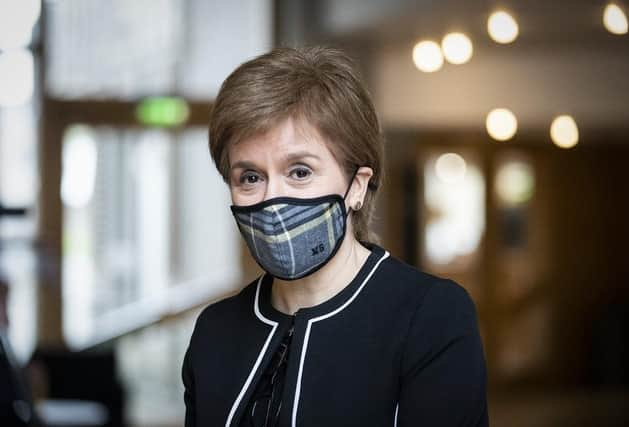Covid Scotland: Were we following the science or following the politics? Paul Wilson


So far we have heard revelations about some appalling behaviour and attitudes among UK government ministers and advisers, conjuring up a kind of carnival of the grotesque at Downing Street.
But the focus of both Baroness Hallett and Lord Brailsford will turn to the science we were supposedly following and the extent to which we were led by it rather than other factors such as politics.
Advertisement
Hide AdAdvertisement
Hide AdIn time, the inquiries will ask difficult questions of former first minister Nicola Sturgeon and her administration, such as why was the public not informed about the first outbreak at a Nike conference in Edinburgh in February 2020 until three months after it took place?
And why were patients discharged directly from Scottish hospitals into care homes after they had tested positive for coronavirus?
Of course Sturgeon had to shoulder an enormous burden when the pandemic hit, taking difficult decisions that no first minister could ever wish to face.
She was open about the heavy toll this placed on her personally, as she imposed restrictions on things such as families’ access to relatives in care homes and hospitals.
But politicians cannot proclaim while making these big decisions that “the buck stops with me” and then, in the aftermath, abdicate responsibility by professing feebly that they were “just following the science”.
If science was the only guide we may as well have been led by scientists rather than politicians. And they may have told us that, scientifically, the safest thing for us all to do would be simply to lock ourselves away from all forms of human contact for a year or two.
It is the job of the politicians who take decisions to heed scientific advice but also put it in the broader context of potentially adverse effects on society and the economy as a whole.
As the UK entered lockdown on March 23 2020 Sturgeon and prime minister Boris Johnson appeared united in adversity, but the coronavirus rules north and south of the border diverged increasingly in the months and years that followed.
Advertisement
Hide AdAdvertisement
Hide AdPubs may have to close at 10pm in England but in Scotland they must close at 6pm, and there must be no background music.
Small groups of people in England may be allowed to meet in homes of people they do not live with, but in Scotland it must be outdoors and restricted to six people from a maximum of two households.
In England the government may have deemed 30 people a safe maximum number of mourners to attend a funeral, but in Scotland the maximum must be 20.
Were we in Scotland following different science from England, or were we just doing things differently for the sake of it and because we could?
If it was not science that was dictating this difference then what was it? An urge to demonstrate that Scotland might best be left entirely to its own devices, free from the yoke of Westminster governments led by the likes of Johnson?
It is not a stretch to imagine there was an element of politicking going on, and that Sturgeon, at least to some extent, hoped to gain political advantage.
What science was Sturgeon following when she refused to rule out a quarantine system for people coming to Scotland from other parts of the UK, as though the march of the global pandemic could have been arrested at the Tweed? It was a suggestion that, incidentally, led to the unedifying sight of some of her more excitable followers hurling abuse at motorists as they travelled north.
Sturgeon’s constant push to impose stricter rules affected restrictions in England too. WhatsApp messages suggest Johnson introduced face masks in schools for the first time after he was told it was “not worth an argument with Sturgeon” over the issue.
Advertisement
Hide AdAdvertisement
Hide AdThe policy was introduced, despite England’s Chief Medical Officer Sir Chris Whitty saying there were “no very strong reasons” to do so, and it remained in place for 16 months.
Sturgeon’s communication skills and ability to show empathy were in stark contrast to Johnson’s bumbling boosterish schtick - hardly what the times called for - and she seldom missed an appearance at her administration’s televised daily briefing to journalists.
She would explain the tough decisions she was taking, stressing how difficult the whole experience was for everyone, including herself, and the need to “follow the science”.
Distant commentators hundreds of miles from Holyrood marvelled at her “relatability” and bemoaned the fact they could not vote for her.
Sturgeon’s personal approval rating soared and support for independence reached a new high.
The public should rightly expect to get a measure from the inquiries of how much politics played a part in the decision-making process.
But, in the case of Sturgeon and her Covid team, it seems this will not be possible because messages have - for whatever reason - been deleted.
This means we may simply never know precisely what drove the pronouncements that had such a profound and often devastating impact on people’s lives.
Advertisement
Hide AdAdvertisement
Hide AdIt already seems clear one of the lessons that must be learned from these inquiries is the absolute necessity of maintaining full records of communications, including WhatsApp messages. Sturgeon’s legacy in this regard is already badly tarnished.
No one can question how difficult the task of leading Scotland through this crisis must have been.
But there are legitimate questions to be asked over the rationale behind difficult decisions that were taken.
Without a full record, these questions can never be satisfactorily answered.
Comments
Want to join the conversation? Please or to comment on this article.